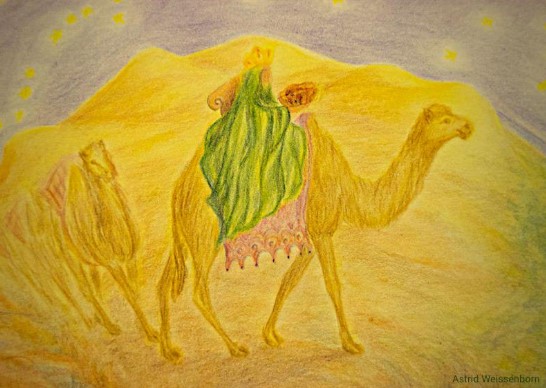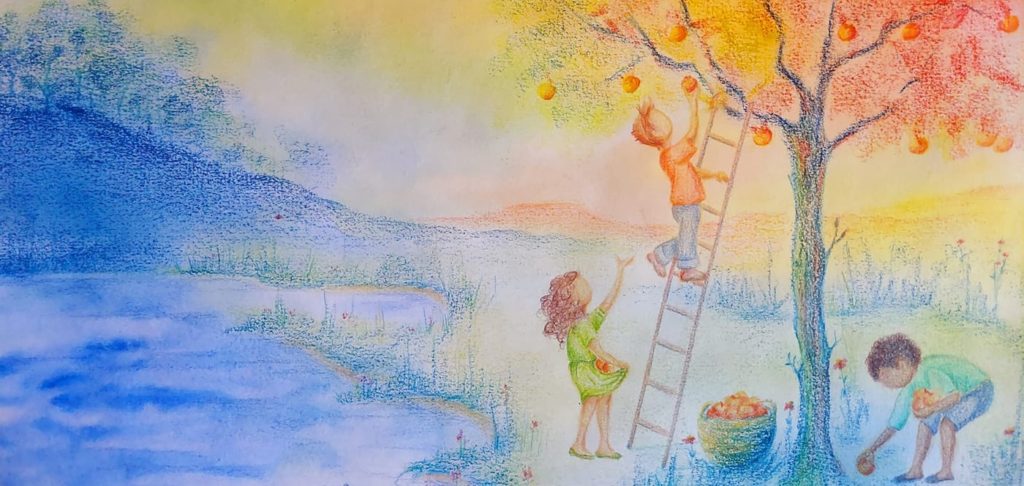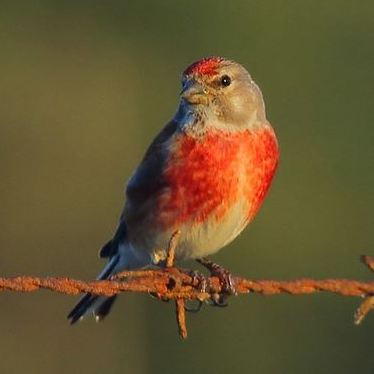7 short stories by Georg Dreissig
the old porter
1. A HANDFUL OF STRAW
One night, Mary and Joseph knocked on a peasant's door and asked for shelter for the night. But the peasant was a grumpy, hard-hearted man who didn't like to help without getting paid. But when he saw that he couldn't get anything out of those poor people, he showed them a corner of the yard and said, "There, where the roof sticks out, you can lie down on the ground." Maria then asked softly: "And wouldn't you have a handful of straw, so we don't have to sleep on the cold earth?" The peasant's eyes gleamed with anger. But then he relented: "Well, a handful I give, but nothing more." And he himself went to the barn and took a handful from the huge pile of straw, gave it to Joseph, and slammed the door.
Joseph looked worriedly at that little bit of straw. What would he do with just that? Maria, however, took them gently from her hand and began to scatter them on the floor, straw by straw. And look: the straw was enough to make a bed for the two of them, and even the little donkey still had a little left over. So the three of them could even sleep well.
The next morning, before they left, Mary and Joseph thanked the unkind innkeeper. He grunted and let them go. When he himself went to the backyard later, he noticed again the straws, which were still scattered where Maria and José had slept, here one, there another, just a handful. He already wanted to be angry that the two guests hadn't tidied up their straws. But when he looked more closely, he saw that they were pure gold. He picked one up and dangled it in his hand. With the other hand he slapped his forehead and exclaimed: “You are a fool! I should have let these people sleep inside the barn, for then all their straw would now be golden!” Well, now it was too late. But at least he decided to sell the few straws that remained there for good money. The peasant, hard-hearted, wrapped them in a cloth and walked to the nearest town. After much haggling, he found an ear, which would pay him a good price. Satisfied with the profit he'd made from the poor shelter he'd offered, he pulled the straws from the cloth. How perplexed he was, and how the goldsmith laughed in his face, when only ordinary straws appeared out of the cloth!
So the peasant only brought home this mockery, which remained with him for a long time, because of the gift of the holy family, which he would have liked to have sold.
2. THE POOR WOMAN'S HOT SOUP
Rebeca was the poorest woman in the village. She only had the clothes on her back, which was very little, for her skirt and blouse were tattered and her socks and shoes were full of holes. Everyone knew her, and Rebeca knew all the people in the village and knew where she could ask for something when she was hungry and where it was possible to sleep sheltered, when the harsh winter didn't let her spend the night outdoors. She lived miserably, but she was used to it and couldn't even imagine that it could be any different. Once, a farmer told her that he really felt sorry for her and she replied, “At least I know I don't suffer from something that you do!” And as he looked at her very astonished, she continued: “I beg alms from all of you. But no one ever came to ask me for anything!” And with a mischievous smile, he took the bread the farmer had given him, tucked it under his arm, and left.
But in that winter in which this story I want to tell you took place, there was a great need in the region, and the people barely had enough to satisfy their hunger. The beggar woman could only find help with great difficulty and had to knock on many doors to get a small meal. One day, Rebeca had asked for some hot soup, and what they gave her was barely enough to fill half her pitcher. As she sat by the side of the road to eat, she suddenly saw a man and a woman approaching with a donkey. You've guessed it: it was Mary and Joseph on their way to Bethlehem. The man looked very downcast, and the expression on the young woman's pale face was so pained that even Rebekah felt sorry for them. “Hey, friends!” – she called – “why are you downcast and so sad? What do you lack?” José looked at her silently, taking a quick glance at the jar in her hand. Maria, however, replied softly: “We have nothing to eat, so it is difficult to walk.” Rebecca asked: “But why don't you buy something?” "We don't have money to buy food." – was the answer. "And why don't you ask?" – Rebecca wanted to know. “We tried” – confessed Maria embarrassedly – “but nobody wanted to give anything.” The beggar woman replied, “Yes, I know. Times are bad. Everyone has little. Look what they gave me!” And he showed them the pitcher with that little bit of soup. And suddenly he had an extraordinary idea, an idea that had never occurred to him in his entire life. And she asked cautiously, "Do you have any vessels there?" Yes, Mary and Joseph had a bowl. "Then let's share" - decided the beggar woman - "my soup and your hunger." José unpacked his bowl, and Rebeca poured some soup into it, and then some more. Her own jar was empty, but she held it in such a way that Mary and Joseph did not notice. When the poor woman saw the two hungry people eating their soup, she felt a joy she had never felt before. He even momentarily forgot his own hunger.
Ah, it took Maria and José only a few minutes to finish the soup, and then they were on their way again. Rebeca remained for a long time following the travelers with her eyes, who had taught her a feeling that was unknown to her and had given her so much joy. Finally, when he bent to pick up his empty pitcher, he saw that it was filled to the brim with a delicious, hot soup that satisfied all his hunger.
3. NEXT TO THE SHEPHERD'S CAMPFIRE
In the fields before the gates of the city of Belém, a bonfire was burning. Around her, seated, some shepherds were warming themselves, for it was winter and the nights were cold. Around them, in a circle, the sheep lay in calm and peace. Only the dogs passed incessantly through the flock, and kept watch. “How good it would be” – suddenly sighed Samuel, the young shepherd – “if there were no more wolves threatening the flock…” Jacob, however, stubbornly shook his head and replied to his companion: “What is the use of dreaming? As long as there are sheep, there will be wolves that threaten them.” Then Elias the old man, raising his white head, looked at the two with his clear eyes and said mysteriously: “Who knows, who knows. I heard of a prophecy, which says that one day the wolves will graze peacefully with the sheep.” Samuel soon asked, “When will this be?” The old man shook his head thoughtfully: “In the book it is written that one day the Son of God will be born as a man. Then all enmity on earth will end, and there will be peace between men and animals. But when that day will come, no one can say.”
Thoughtful, the shepherds looked into the fire. Suddenly, they began to hear a beautiful song, so soft, it touched their hearts. When they turned around, an old man and a young woman in blue cloaks were coming along the path that led to the city, accompanied by a little donkey. And the woman sang, sang to the child she carried under her heart, and a serene peace spread through the souls that heard her.
The shepherds continued to watch the woman, until she disappeared from their sight. When they finally turned back to the fire, they noticed that the sheep too had turned their heads towards Bethlehem, and even the dogs had stopped in their indefatigable run and listened, ears pricked. Suddenly, Samuel pointed carefully over the flock and whispered, “Look! There! It's none of our dogs. It's a wolf!” The other shepherds followed his signal and nodded in agreement. Yes, the wolf was with the sheep. Just like these, he was standing, touched by the magic of the song, and looking towards Bethlehem. At that moment, the face of old Elias lit up and he exclaimed: “Just now we thought that the miracle we spoke of would happen in the future. far away, and now he is very near. The Son of God comes into the world. The sign is infallible: in peace, the wolf grazes with the lambs.” Samuel turned to the old man and asked, “Do you think the young woman who sang so beautifully was the Divine Mother?” Elias nodded and replied, “I think so. She must be the Divine Mother.” And in that the old shepherd was absolutely right.
4. THE OLD DOORMAN
Simeon, the old porter, sat by the window, watching the snowflakes dance and thinking of times past. He had already lived ninety years, and had spent seventy guarding the gates of Bethlehem. In the morning, at the first rays of sunlight that shone on the horizon, he opened the gates, and closed them again when the last ray of sunlight was gone. He had watched many people walk in and out of the gates, and over time he had learned to recognize whether they had goodness or badness in their thoughts. Lately, the forces were abandoning him, and only with effort did he lift the heavy keys; the huge gates he could barely move on their hinges. Then a younger man had taken his place. Simeon now guarded only a single gate, one that was small, unobtrusive, on the eastern side of the city walls. This gate, during his lifetime, had never been opened and was called “The High Door”. The key to that gate his predecessor had entrusted to him when he was still young, commanding him to take care that the iron of the key did not rust. Simeon, however, would undoubtedly know how to recognize the time to open the “high door”. So he kept the iron key and looked after it for years and years, but the call never came to him to open the door. With that in mind, the old man got up heavily from his chair, walked a few steps to the closet, and took the key from it. Then he sat down at the window again, and as he watched the silent fall of the snow, he continually rubbed the edge of his wool coat on the iron key and pulley until it began to gleam as if it were silver. "You'll know when the call comes." – his predecessor had told him. When Simeon remembered these words, he was always slightly afraid that one day, perhaps, he would have to open the door, but not be awake for it.
Then he noticed that suddenly the sky began to glow in the East, as if not hidden by snow clouds. The light grew brighter and brighter, and in that light appeared a tall golden door, which opened. From that tall golden door came a little child. She turned and kindly waved her little hand at the old porter at the window, and began to walk down an invisible road to Earth. Meanwhile, she continually looked at Simeon, who watched in amazement at this event. Suddenly, however, he exclaimed: “The high door! The child is coming to the high door, and I am sitting here, eating fly!” As quickly as he could, he got up and, in his wool coat, walked through the snow to the eastern wall of the city. He didn't find anyone in his way. With that time, people preferred to stay in their homes. Even though he could no longer recognize the golden door in the sky, he could still imagine its clear glow in the East. At last he reached the tall door, and was finally able to put the silver key in the lock. This one was easily opened. And then the little portico opened and the tall door opened silently, and on the other side was the Child. With confidence she reached out her hand, and said to Simeon, “Thank you very much, because you heard my call and opened the door for me. I also kept the gate open for you. Look!" When the old porter looked up, he saw again the golden door of heaven. It was wide open, and a bright road led to it. Then Simeon laughed very merrily and began to approach the gate of heaven. The child watched him, until he disappeared.
A few days passed, before people noticed the old porter's absence. They looked for him, but did not find him. So it happened that one day strangers appeared in the city, a man with his young wife and a little donkey. The new porter, however, had not seen them come in and was very much astonished. So he went to the high door; found it open and with the key in the lock. “Did old Simeon get confused in his head and open the door before he left?” - grumbled the man. And, closing the door again, he took the key with him. He did not suspect that the one for whom the high door was to be opened had already passed through it.
5. DANIEL AND THE FLUTE
When Daniel appeared in the streets of Bethlehem and played his little flute, the people could not help but hear him and rejoice. Despite this, Daniel was actually a pitiful boy. He had a weak heart from birth, which did not allow him to play with other children, his left leg limped a little and, what was more regrettable, he was blind. I had never seen the sun, the sky or the wonderful world. But when he played his flute – and this he did wherever he went – there was nothing sad in his melodies. Daniel was a joyful child, and his joy was contagious.
It was midwinter when people woke up one day and, looking out of the windows, saw nothing but a gray veil. The entire city of Bethlehem was shrouded in a strange fog that blocked all vision; and even the familiar alleys and corners seemed strange and unreal. Only one person was unaffected by this: Daniel. So even the fog couldn't keep him at home. Just on that day, a force was pulling him out. At that time, Christmas was not yet celebrated. But the joy that the boy felt was exactly the same as we feel today, when the luminous party approaches. He picked up his flute, and his keen hearing carried him safely out of the city gate. There, he followed the wall until he reached the rock on which he liked to sit. Therefore, even in the fog, he sat down and played his flute: “Daughter of Zion, rejoice!” Ah, now he was no longer the little blind boy, now he was a wedding band, who played for the royal groom and his young wife. He did it with all his ardor and he didn't notice any of the fog that billowed around him and took away the people's vision, so that… Yes, so that Mary and Joseph could find the high door. For the prophecy must be fulfilled: that they should enter the city through it, and through no other way.
Mary and Joseph had lost their way in the thick fog and were wandering in that mysterious world, not knowing where they were. Suddenly, her ears caught the flute singing: "Daughter of Zion, rejoice!" They stopped and listened to the wonderful melody, and then walked again, following the pleasant music. “What angel will be guiding us?” asked the dear Divine Mother. It was then that they saw the boy appear through the mist, huddled on the stone and with the flute to his lips. There they stopped, listening intently to the music, until it ended. Daniel turned to them and asked, “Who are you and what are you looking for here?” Joseph replied, “We are poor travelers and we are looking for the way to Bethlehem.” “Poor travelers?” – asked the boy in amazement. And he seemed to scrutinize them closely, despite his blind eyes. But then he added: “That's the city wall. Just follow him and you will reach the gate.” At that moment, really Mary and Joseph were able to perceive the wall, like a dark shadow. They thanked the flutist and went on their way. He led them to the high door, to that little gate which had been opened for them and which still had the silver key in the lock. There they passed.
Farther and farther away they continued to hear the flute music as Daniel played nonstop. He had to play to express his joy, as he had seen something wonderful! There was a lot of light around him. And in that light he was able to perceive two figures, who carried with them a Child, a small child, who had beckoned to him: “Come!” Yes, he would, when the time came. But for now it had to play, as if the music could drive out all the mist and take all the blindness out of men.
6. THE INNKEEPERS OF BELÉM
Finally, after a long walk, Mary and Joseph reached Bethlehem. They were tired from the long journey, and even the donkey's head hung down in exhaustion. But where would they find a hostel, a place to stay and a bed to sleep in? They went from door to door, knocking here and there, asking the various innkeepers to let them in. But nobody wanted to receive them, because Joseph was poor and could not pay much for lodging. “Go away,” – they always said – “this house is mine, you don’t enter here!”
It was already dark, and Maria and José were still walking through the streets, and the donkey trotted wearily beside them, amazed that they couldn't find a place to stay. Finally, there was only one inn left on the edge of town, a small house with an old, rotten stable in the yard. Without much courage, José knocked on the door. When the innkeeper opened it, they could immediately see that the room was full of people, and they hardly dared to order. But Titus, the innkeeper, looked at them with pity, realized that they were exhausted, that they needed shelter. He scratched his head and muttered, “What shall I do now? Here are two people and a donkey, all very tired and in need of a place to sleep. My inn can house weary people. But the house is full. Even on the benches there are people sleeping. Thoughtfully, Titus glanced around the already dark courtyard. Suddenly his eyes lit up, and he exclaimed: “But the lantern is already lit in the stable! Who knows, it's just waiting for you! Follow me, man, woman and donkey! You will have a house just for you! It's not very big or very furnished. But there you will at least have a roof over your head and straw for your bed.” And where did the innkeeper take them? You already know! To the stable the Christmas mice had tidied up so well, where Remus the ox munched his hay and a little star had hidden inside the lantern and shed its loving light.
So it was there that Mary and Joseph stayed, and also the donkey that had followed them to Bethlehem; and Remus the ox gladly accepted the company. They had finally arrived, yes, finally could… Yes, what? Finally, holy Christmas Eve could descend on earth!
7. THE SON OF GOD
When Holy Night approached, all was very quiet on Earth. It was as if the world held its breath. In the heavens, however, the angels looked up to the highest heavenly spheres, where the cherubim and seraphim formed a circle around the throne of God. And there happened what had been so long awaited, and so ardently desired: Suddenly the circle opened, and the throne of God became visible to all heavenly beings. But from the throne came One, so clear and luminous, so serene and pure, that even with the tongues of angels it would not be possible to describe it. Cordially, He looked at the circle of angels, who only wanted to reverently behold Him. Then He stepped aside, and the Father's earnest and holy gaze pierced the spheres of heavenly beings. Before Him, a luminous path opened, descending lower and lower to Earth. There, then, the celestial beings saw a poor stable, where a woman and a man were sitting by a manger, with the donkey and the ox. The man was very sleepy. The woman, however, turned her gaze to the sky, and when she saw the luminous path, she raised her arms. At this, the Being of Light, the Son of God, who had left the throne of God, began to descend along the luminous path, descending lower and lower, greeted and accompanied by the choirs of angels, whose singing intensified as He passed. . As He passed from one celestial circle to another, He continually changed; he stood first as one of the higher angels, as a seraph, as a cherub, and changed one form of glory for another, as if they were garments. Then He came to the circle of archangels, then to the circle of angels, from which He soon left. The poor stable shone brightly as the Shining One approached Maria and bent his luminous shadow over her. Its light, however, was reflected in the eyes of the tiny Child that the Divine Mother held in her lap. Then again the choir of angels resounded in heaven, and the earth reflected the heavenly beings' song of praise: "Today a Saviour is born to us, who is Christ the Lord."
Since that night, the circle of seraphim and cherubim has never closed. The luminous way continues always descending from the throne of God to the Earth, and Christ walks along it every year, from the Father to Men, to be born among them and become like them; and to plant His light in their hearts, so that this light radiates from their eyes, just as it radiated one day from the eyes of the Child Jesus.
credits
Realization of the Waldorf School Rudolf Steiner
Original Title: Das Licht in der Laterne – Adventskalender in Geschichten
Author: Georg Dreissig
Title in English: THE LIGHT IN THE LANTERN – An Advent Calendar in Stories
Translators: Ione Rosa Matera Veras, Mariliza Platzer and Edith Asbeck
Typing by Vanessa VB Mendes and Walkiria P. Cavalcanti – March 2013.
Review by Ruth Salles – September 2017.
END






